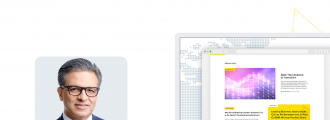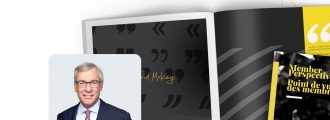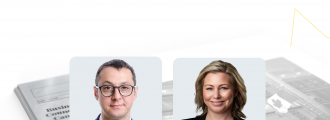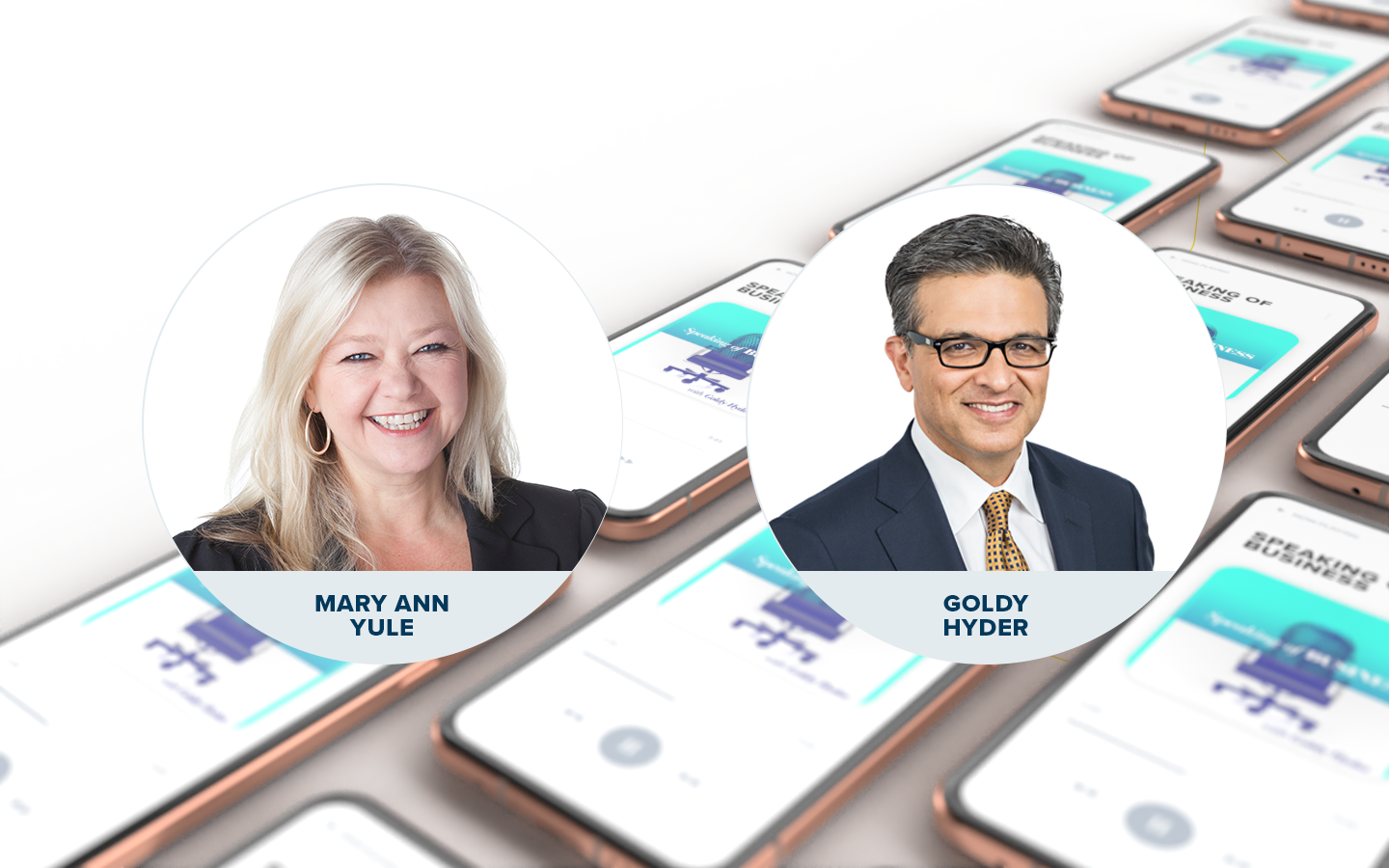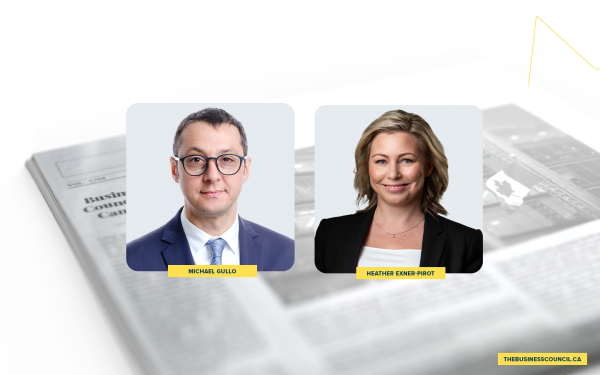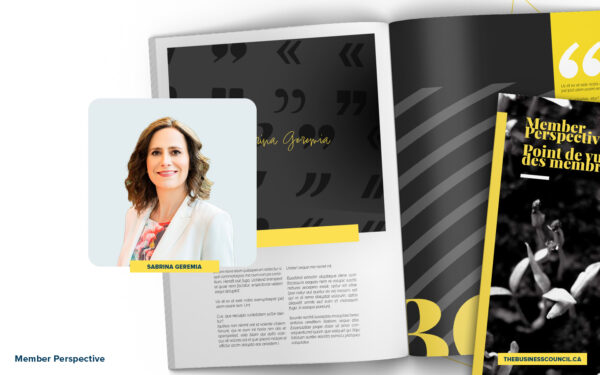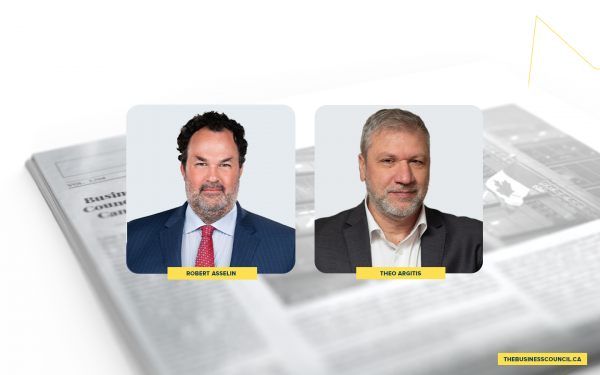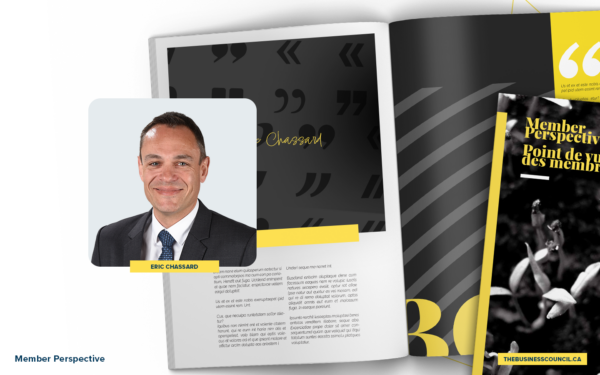COVID-19 and lessons in leadership – Mary Ann Yule, HP Canada
Mary Ann Yule worries about the long-term economic impact of the COVID-19 pandemic on women. “Many working women struggled to balance the responsibilities that came with assuming dual roles,” says the President and CEO of HP Canada. “They are 12 times more likely to step away from their jobs to take care of their family.”
The risk, she points out, is that many women’s career trajectories will be hindered or knocked off course. She cites a recent study that concludes global GDP could be one trillion dollars lower by 2030 if action isn’t taken to mitigate pandemic-related job losses for women.
In a wide-ranging conversation with Goldy Hyder on the Speaking of Business podcast, Yule discusses solutions to ensure all employees are engaged and supported – including through mentorship and hybrid work options.
And she offers her own lessons in leadership. “There is a privilege that comes with leadership – and an obligation. We need to pay it forward by helping young leaders and blazing the trail for future generations.”
Listen to the full conversation – including how and why HP Canada is investing in the circular economy – on the Speaking of Business podcast.
Subscribe
You can find Speaking of Business wherever you get your podcasts.
Latest Podcasts
Transcript
Mary Ann Yule:
Everyone needs the freedom to disconnect. Confronting the burnout from the last two years is quickly becoming a bottom line issue for employers, and there’s no one-size-fits-all remedy. Flexibility looks different for everyone.
Goldy Hyder:
Welcome to Speaking of Business: conversations with Canadian innovators, entrepreneurs, and business leaders. I’m Goldy Hyder, President and CEO of the Business Council of Canada. I’ve said it so many times in the past couple of years, the COVID-19 pandemic has led to an acceleration of change. Just think about how quickly we adopted digital technology over the past two years; we changed the way we work, the way we business, the way we interact with each other. And even though we are, and I say this thankfully, no longer locked down in our homes, the digital transformation is here to stay. Mary Ann Yule has a unique perspective on that transformation because she is the President and CEO of HP Canada, and she’s spent decades in the technology sector. As a leader, she’s not only focused on cutting edge innovation, but also on mentorship, corporate culture and supporting employees during a time of rapid change. Welcome to the podcast Mary Ann.
Mary Ann Yule:
Hey Goldy, thank you very much for having me.
Goldy Hyder:
Well, it’s so good to have you here. In this introduction I talked about acceleration of change and I want to start there because it’s probably the most common thing I’ve heard from CEOs across this country is the pace of change. But from your vantage point, I’m wondering, what did it look like in real terms?
Mary Ann Yule:
Well, for certain, the pandemic accelerated change. At HP we saw the rapid adoption of technology to help Canadian businesses and public sector survive, maintain and even thrive during those very unpredictable circumstances. I was on vacation in the Caribbean the week prior to everything being shut down in Canada. Like you, I often work remotely because of travel and whatnot, but that vacation was my T minus zero to working remotely for the next two years. So while on vacation, I worked with my team on closing the HP Canada offices, ensuring our employees were safe, that our business continuity and resilient plans were executed so that we could continue to serve our customers and partners. And at the same time, I’m also taking urgent calls from the Caribbean from many Canadian leaders in business and public sector who needed assurances about securing HP PC and print technology for their workers who would be working from home imminently, as well as how do we deal with and help with the need now for kids learning from home? Then in mere days, we were all working and learning from home.
Mary Ann Yule:
So alongside this accelerated shift to hybrid workforce, it meant an accelerated surge in cyber attacks, putting digital assets at risk. And I’m sure you’ve seen the stats Goldy, a quarter of Canadian businesses say they have been a victim of cyber attack in 2021. So this new thinking is now required where organizations continue to remain competitive post-pandemic as they continue to be flexible, open to change and rethink how we work needs a new approach to security. And the pandemic presented many, many challenges and I was super impressed with the resiliency of business and public sector across our country, as they continued to power the Canadian economy forward.
Goldy Hyder:
Well, you talked about challenges and one of the things I wanted to pick up on, because there’s a lot that you said there that I think we can unpack over the course of this podcast. But just tell me as a leader, what was the greatest challenge for you personally over the last two years?
Mary Ann Yule:
As a leader, the biggest challenge was leading an organization through a pandemic. That’s been the biggest challenge, and it just further reinforced some of my beliefs around strength and creativity can triumph over any challenge. And Goldy, I spent some time reflecting knowing that you’d probably ask some questions about the challenges of the pandemic and I thought about things that I’ve learned over the last couple of years, and there are three key lessons that stand out for me: Leading with BEST, B-E-S-T. I put authenticity at the center of everything I do, and you know me, and my team knows me, and they know that I talk about being my best. It’s an acronym and a mantra that I created a long, long time ago, Better Every Single Time, where whatever you do, myself, my team, whatever you do, do it marginally better every single time you do it.
Mary Ann Yule:
And those daily momentary incremental improvements will produce significant improvements over the course of time. And that applies to my ever evolving authentic self, where being an authentic leader, a leader who’s transparent and empathetic truly helps overcome challenges and demonstrates that we can trust employees with hard truths, and that we must all support one another as we figure out how to adapt. The second lesson is that everyone needs the freedom to disconnect. Confronting the burnout from the last two years is quickly becoming a bottom line issue for employers, and there’s no one-size-fits-all remedy. Flexibility looks different for everyone so finding that right solution that balances the organization’s performance needs with the needs of employees requires understanding, empathy, and support from leaders and teammates. So it’s essential, it was, and it is that we develop excellent policies and practices that accommodate employees needs without restricting their career opportunities.
Mary Ann Yule:
And thirdly, to celebrate creativity and partnerships. Without the access to the same broader range of resources we had in non-pandemic times, we’ve had to overcome business challenges big and small by harnessing the creativity of our teams and partners. I’m really proud of our digital manufacturing partner network of small and medium businesses across the country that all came together to 3D print face shields and critical PPE and to create a domestic supply chain. We saw our PC and print partners leaning in with us to jointly serve our customers, to ensure that our customers could keep their businesses running. And we paid it forward with donations of PCs and printers to help students, families, and communities. All these efforts demonstrate how creativity and partnerships can build innovative, sustainable and agile solutions.
Goldy Hyder:
I first of all, love the BEST acronym. That’s one of the coolest acronyms I’ve heard, Better Every Single Time, I will be shamelessly borrowing and plagiarizing that one right starting at home. I hope my girls are listening. Let’s start there because that’s about culture, right? Ultimately this is about culture. Can you get that culture without having collaboration that human interaction brings in a non-technologically based way like the need to come to office? Is that possible?
Mary Ann Yule:
It’s possible, it’s just more challenging, right? We’ve all made it possible over the last two years with all the different video tools that we have. But there is something that’s missed Goldy, and I think about that relative to the Business Council meetings, where we’ve had great meetings that you’ve hosted and we’ve had great speakers, but that banter and those relationships that have cultivated and abilities to collaborate when we’re grabbing a coffee or walking down a hallway with all the various people, doesn’t exist the same way anymore. You can’t just have that side conversation with someone.
Mary Ann Yule:
So I think the answer on this and everyone’s arrived there is hybrid workforce environment. We will be working from home and we’ll be working in the office, because we still need that human connection, we still need that ability to collaborate to solve problems but we also need just that human connection because we’re social animals. So to be able to see someone in the office that you haven’t seen to be able to just connect, that sparks a better mental health, better wellbeing, and it also sparks creativity and conversation to solve in a different kind of way.
Goldy Hyder:
Yeah, that co-creation is so important to this, right? I mean, the technology certainly has been enabling in terms of access and availability, but all the things you mentioned, right? The incidental overhearing something, the chatter at the water coolers you mentioned, or we all know the best conversations happen in the parking lot afterwards, about all the things you should have said in the room that now you say in the parking lot. How concerned are you that there’s a risk of cultural erosion that changes the way that you might have to be a CEO?
Mary Ann Yule:
I’m not concerned about the cultural erosion. I think the culture can still be something that we celebrate and that we work on and we continue to evolve, and I think it’s evolution that we’re doing right now. Employees have a requirement. The data shows that everybody wants some sort of a hybrid work, no one wants to go to the office full time. Employers want people to come to the office for all the reasons we just mentioned about developing culture, but I think we just have to be thoughtful and mindful of how we do that hybrid work, and when we gather people, and when we expect them to get together and collaborate differently, and how do we ensure that we’re engaging with people when we’re on video calls? Because one of the areas of that is if you’re an extrovert, you’re going to jump in and have a conversation and share your opinion regardless of the format.
Mary Ann Yule:
People that are introverts, they think differently. They’re brilliant, but they think differently and they aren’t those people that are going to put themselves out there. So it’s essential that when you’re leading a meeting, that you ensure that you collect the opinions and thoughts of the people that are on the call that wouldn’t ordinarily step forward. When you’re in a meeting room, it’s easy to see that because you can see their facial expression, you can see body language change, but sometimes on a call you cannot. So we have to proactively seek out those opinions for those people that perhaps would be reticent to share them in that kind of a format. Because you’re on a big screen, it’s a very strange dynamic.
Goldy Hyder:
Well you’re right about personality. I like the phrase thoughtful and mindful, I think that is the right approach. You know, you and I have talked about this and we’ve certainly heard about this from other colleagues. It seems that just possibly maybe what the employees really, really wanted was flexibility, and the solution employers are offering them is hybrid. Are they the same thing?
Mary Ann Yule:
I guess sort of they are Goldy, but I think that the pandemic drove it home differently for different workers and different generations of workers, right? We all have multi-generation workers that have different perspectives of that. I think young people that are on devices all the time have a different relationship with technology and a different relationship with being on video for things and posting things in video and photos and all of that, so I think there’s a different relationship with people and where they want to be able to come to work. So it is flexible, but it needs to be thoughtful about how is flexibility defined today by the different people in your organization with the different outcomes that you need to drive your performance.
Goldy Hyder:
Yeah, the other thing you mentioned in your three list of sort of best and balance and the celebration piece is this notion of right to disconnect.
Mary Ann Yule:
Yes.
Goldy Hyder:
Ontario’s bought forth some legislation related to that or guidance at least in terms of how to handle that. Where do you see that going? I mean, is this really going to be a place where you say, okay, you go home and that’s the end of it?
Mary Ann Yule:
I think that for my organization it will be, depending on your role and responsibilities, there will be different disconnections from work, right? There’s certain roles that there’s an expectation. I worked on the weekend, because there’s an expectation. I had to manage something that had to be managed and they couldn’t wait, so I’m not going to cite a legislation to say I can’t work that weekend. But I think again, it’s back to that empathy and understanding of the needs of your business and your employees needs and balance that effectively. Even during the pandemic with all the video calls, I told my team, not every call needs to be a video call, video calls are daunting. And I like you Goldy, we have the luxury. I have an office in my home, I’m set up, I have some privilege. There are employees though that are individual contributors earlier in their career that maybe working from their kitchen table and they’ve got their kids learning from that kitchen table because it’s a two bedroom apartment.
Goldy Hyder:
Oh, yeah. We’ve all seen that, haven’t we? Yeah, we’ve all seen that, haven’t we?
Mary Ann Yule:
Right? So it’s really invasive now to have a meeting with these individuals and expect them to be on video when their whole family’s around this kitchen table, that is the center of where all the work happens and walk into their house. So we have to be conscious of that and we have to prepare our employees. So if there’s an absolute time where you need them to be in the office or you need them to be on a video call, let them know in advance of that so that they can prepare themselves, because people will then stage their bedroom or stage their kitchen or shush their family or take their dog outside or whatever they need to do in order to feel comfortable and confident that they’re representing their best self.
Goldy Hyder:
Now you’ve been a real champion as many members of the Business Council in the importance of women in technology. But before I ask specifically about that, I want your thoughts, has COVID disproportionately impacted women in a much tougher way than men?
Mary Ann Yule:
In a word, yes. The pandemic was tough on women, especially mothers, visible minorities, new immigrants, young people, you’ve seen the data points on that. If I look at some of the specifics, women of color, they experienced the brunt of this. Something like 10 and a half percent of minority women were unemployed in November 2021 compared to just over 6% of white women. And a fascinating data point, many working women also struggle to balance the responsibilities that come with assuming dual rules. Did you know that women are 12 times more likely to step away from their jobs to take care of their family?
Goldy Hyder:
Yeah and it happened, I think many women have withdrawn from the workforce, which is part of the labor shortage we’re facing.
Mary Ann Yule:
Exactly, but that also depleted women’s confidence in feeling like they belong in the workforce. So when that happens naturally, inevitably it dulls their optimism for their career potential. We also commissioned a study and it shared with us that only 25% of women applied for a promotion. And what’s more interesting is that of those that applied, only 29% actually got the promotion compared to 52% of equally qualified men. So while these inequities have been in place a long time before COVID, they’ve been exacerbated during COVID. And it’s not just that the individual woman has a challenge being promoted or securing a job or had to exit the labor force, there’s data, there’s a report by McKinsey that says global GDP will be a trillion dollars lower by 2030 if we don’t take action to mitigate job losses for women.
Goldy Hyder:
Wow.
Mary Ann Yule:
That’s huge.
Goldy Hyder:
Yeah, that’s a huge number.
Mary Ann Yule:
Right?
Goldy Hyder:
You know, for context that’s half the Canadian economy.
Mary Ann Yule:
Exactly.
Goldy Hyder:
Yeah.
Mary Ann Yule:
Tremendous numbers. So we need to… The research shows it, companies acknowledge it, employing women has a positive effect on their business yet not all employers are adapting inclusivity practices to help women stay employed. And we see female leaders doing a great job, particularly during a time of crisis. They outperform their male counterparts in certain areas like leadership traits, like inspirational behavior or participative decision making and role modeling. They’re exemplified in a gender balanced executive team and it delivers better results for the company. So we have work to do there to continue the momentum we had pre-pandemic to get women back into the workforce and adopt our policies, practices and procedures so that they can thrive and contribute to organizational success.
Goldy Hyder:
Now we’ve been talking about the impact of COVID specifically on women, but you’ve been in the business world for decades now and I’m wondering if you could just for the benefit of our listeners… Often there’s a lot of young people listening here and I’m wondering if you could just talk about your own career journey. What sort of barriers did you encounter? Because it would’ve been very different than what we’re seeing today, I would hope, but just share with the listener, if you will, your own journey to this place.
Mary Ann Yule:
Sure, Goldy. Thanks for the question. Yeah. I mean my experience as a female leader in technology, it’s kind of driven my passion to be a champion of inclusive workplaces and to mentor talent to realize their full potential. I’ve had a unique career path and journey to leadership and I fortunate as a child of working class immigrants that my parents raised me with a growth mindset and an attitude that my career possibilities were endless. But despite my parents’ encouragement, I struggled to find female representation and mentors and I was often the only female leader in the room. All leaders, men and women, we have a role to play in empowering women in the workforce. I’ve gained valuable insights and fresh perspectives on issues from both my mentees and mentors, many of who have been male. They gave me the courage to realize my potential and ultimately enable me to get where I am today. So I truly believe that there’s a privilege that comes with leadership, and I even would suggest that it’s an obligation that as leaders we need to pay it forward by helping young leaders, and for us to blaze the trail for future generations.
Goldy Hyder:
Tell me about your current efforts to mentor young women. You’ve talked a lot about, in some of the things I’ve seen and read and you just mentioned it now, but that there is a satisfaction and a return on that investment for you as a mentor. How are you benefiting being a mentor?
Mary Ann Yule:
I love being a mentor. It gives me great pride to mentor employees and professionals from all different walks of life. And I gain great insights and fresh perspectives on issues and opportunities from people, both young and experienced that I mentor and personally there’s nothing more rewarding than seeing them thrive and succeed. It’s a high, it’s really exciting. Young people are inspired and they’re motivated by role models. If you can see it, you can be it. And as a leader, as I mentioned, I have a privilege that comes with my position to pay that forward and lend a hand. I’m a global sponsor at HP for our next generation Young Employee Network, and I’m an official ambassador of the Girls E-Mentorship initiative, GEM. And I’ve seen firsthand the impact that both simple gestures and investments can make in the lives and careers of others.
Mary Ann Yule:
So while I hope that my perspective has a positive impact on others, they tell me it does so that’s great, the truth is that I benefit from these experiences. At HP, I’ve done reverse mentorship, I’ve practiced that regularly because it gives me an opportunity to see solutions and opportunities from different perspectives. If I think about an example when I was working with a business student or mentoring a business student through CEO for a day, it was a great moment in reverse mentorship. I took the opportunity to see solutions and ideas through this fresh lens and while offering guidance based on my experience. It’s truly an invaluable exchange.
Goldy Hyder:
One of the other things that you’ve… By the way, I just love all the sayings that you have, I’m writing them all down. “If you can see it, you can be it.” That’s a good one as well. You talk about in the past, again, it just may have been impacted by the COVID, but I’m wondering, you know you say, “Bring your whole self to work,” another one of your mantras. How do you think you can build a culture that supports that idea in a remote work or hybrid environment? Like is it still possible to bring my whole self to work?
Mary Ann Yule:
Authenticity helps us all thrive. We all thrive when we are our authentic selves, when we bring our whole self to it, as opposed to sending some sort of reflective veneer to people that have an expectation of who you should be or how you should be. When you bring all of you, you bring all your creativity and all your thoughts and all your experiences to the table. So then what happens, it’s a dual responsibility, leaders need to seek that out. And as an employee, you need to have the courage to be your authentic self, which sometimes means you may be a little clumsy at it until you get good at it.
Mary Ann Yule:
But we have to seek out the thoughts and opinions of all our employees even if they maybe a little bit out there, because it’s going to be the people that are out there with the ideas that are going to spark things that we can actually do and create. So we have to just be mindful of it, we have to proactively reach out and solicit those inputs of people and make them feel comfortable when they do express something from their authentic selves. And by making them feel comfortable and confident that they’re valued, we’ll get more and more of that and we’ll get more and more creative thinking and ideas and innovation as a result of people bringing everything they’ve got to the table.
Goldy Hyder:
Yeah, it’s going to be interesting to see how all this unfolds. One of the things that you’ve had a chance to also kind of had a front row seat to is the functioning of our country, right? I mean, HP is a national, it’s across the country, obviously it’s global as well, but what did you see in terms of how we managed the pandemic? What were our strengths? Where were some of the gaps? What’s your observation on how Canada faired?
Mary Ann Yule:
I think Canada faired very well. I think that what I’ve seen is this tremendous resiliency that Canadians displayed on all fronts. You look at our healthcare workers, they were miracle workers. You look at business leaders, everybody did the best they could to continue to further the economy. Employees, citizens, all worked together to make sure that we stayed safe, that we… Our vaccination rates will prove that. We all participated and all with the agenda of staying safe and healthy and secure and continuing to drive our economic growth.
Goldy Hyder:
I like the optimism in that. I think people are looking right now for time of hope, but there are lessons to be learned and I assume you would agree that it’s important that we take the time at some point to look at how we can do better.
Mary Ann Yule:
Oh, absolutely, we could always do better. We have an opportunity to make our comeback stronger than our setback and reaffirm ourselves on the global stage with innovation, but we need to move quickly. We look at setting aggressive goals to fight climate change, reworking policies to breed innovation, building synergies across industry and investing in the Canadian labor force. These are all things that are going to propel our country forward. And I support the letter that you wrote and sent to the deputy prime minister and minister of finance regarding the 2022 federal budget. We are facing several macroeconomic challenges that could have severe implications for our future, but we need to prioritize actions around creating an improved environment for business investment, enhancing our labor force, developing an industrial strategy powered by innovation, supporting the government’s greenhouse gas emissions goals, committing to fiscal sustainability. All this will enable us to recover and in tandem make meaningful change.
Goldy Hyder:
One of the items that you mentioned there, Mary Ann, and it’s probably the thing I hear the most from CEOs across the country is talent and workforce and labor and labor shortages, and so forth. How are you finding the market? How are you finding your situation there? And how is it that you think we can compete with really mobility of labor now has never been greater than it is today?
Mary Ann Yule:
You’re absolutely right. It’s a very interesting time in the labor market. You know this, there’s a war for talent right now with more people reconsidering where and how they work more than ever before. And what’s important to remember is that we need to build teams that reflect the communities we serve. As we lead the way on business transformation, we have this unmissable opportunity to create a diverse, equitable and inclusive workforce to drive innovations. Job vacancies are at an all time high. It’s an employee’s market, so employers need to really start thinking creatively about not only how they can remain competitive among potential prospects, but also how can they up-skill current employees to strengthen employee retention? We need to continue to reinvest, to invest in re-skilling programs that have displaced workers and seize opportunities in expanding sectors.
Mary Ann Yule:
We have opportunity with lots of work to do, and I think that everyone obviously is looking at how to make this happen. One of the key areas that we’re doing in one of our recruitment strategies is rooted in our commitment to close a systemic gap in the recruitment of Black Canadian talent. We’re partnered with Onyx Initiative to connect directly with Black university and college students and provide job opportunities in corporate Canada. So we need to continue to develop a wider net and to make sure that we create the tools and resources so that we have more and more excellent talent available for us to source from. And also, as I said, to be able to creatively understand and creatively solve for how do these workers want to work? What does this new hybrid work look like for them so that we can remain competitive?
Goldy Hyder:
Well, it sounds like there’s a lot of work to do, and that work is happening in large part due to leaders like you, so thank you for that and thank you for joining us on this podcast today. You covered a lot of ground and I think there’s a lot of rich content here. One of the questions we’re asking, I guess the question we’re asking this season’s colleagues who are joining us is simply this, is there a big idea that you think can help transform Canada? And if so, what is it?
Mary Ann Yule:
Yes, I’ve been listening to your podcast and I know you’ve asked everyone that question so I figured there’d be that question for me as well. I think we need to ensure that as our economy moves forward on the road to recovery, our planet doesn’t get left behind. Creating new industries and value chains and clean energy and green technology where Canada can increase efficiencies, help build communities with sustainability in mind, it will enable business to scale up faster. It’ll create job opportunities and it’ll accelerate our progress towards a circular economy. We have to act now. I think the number is something like over 80%, 84% of Canadians agree that better solutions to mitigate climate change need to be put in place immediately, and over 60% believe that sustainability is mandatory for business.
Mary Ann Yule:
So how we do things is just as important as what we do. And this mindset has allowed me… I’m going to brag a little, has allowed HP Canada to be Canada’s most sustainable technology company. And overall, globally, our commitment to sustainable impact has helped us win more than $3.5 billion of new sales, new business in 2021. We have a very ambitious goal to become the most sustainable and just technology company by 2030. I think that’s a big area that we can spend time and energy on. Sustainable procurement is a big part of what’s going to help Canada achieve our climate goals, and it doesn’t seem to be talked about a lot.
Goldy Hyder:
Yeah, I know that’s very interesting. You caught my attention on that one, I’ve not heard that.
Mary Ann Yule:
You know that public sector spending is a big role in our Canadian economy, I think that government procurement is about 13% of our GDP. So that scale of economic activity presents an opening to drive sustainable action. Historically though, and today even still, procurement processes focus on balancing price and functionality, but it’s shortsighted because it often overlooks the long term costs. Some organizations resist adding sustainability criteria to their procurement contracts because they’re uncertain of what the market can supply and then they’re wary of potentially limiting themselves to a small number of suppliers, so demand plays a big role in this dynamic. But in this current linear economy where buyers prioritize the lowest price on goods and services, we all end up just competing on price. And competing on price alone, encourages suppliers to offer products that are less repairable or recyclable, made with less sustainable materials, have shorter lifespans.
Mary Ann Yule:
So we need to start having the sustainability criteria included in RFPs and considerations by companies and government that it actually has some weight. It also breeds innovation and we have this great organization in Montreal that HP’s partnered with now for over 18 years, they’re called the Lavergne Group. They have this brilliant IP that they’ve created in country and they work with us on our Closed Loop Plastics Program where we together have helped divert almost 5 billion, that’s billion, plastic bottles from oceans, waterways, and landfills, and we use that to create our products. We’re putting it back into our products, this is the circular economy. So I think there’s an opportunity there. Sustainability is a team sport and we all need this all hands in mentality from Canadian leaders and governments to make a real impact.
Goldy Hyder:
I’m going to sneak in a final question, because that answer, I think, contained a lot of stuff that people have not heard on the podcast before and obviously it’s important that we educate people on this podcast as well. I want to just you as a concluding question then, what specific things is HP doing with the sustainability agenda?
Mary Ann Yule:
Well, we’ve been leaders in sustainability for a really long time since the inception of our company almost. So we have programs like the one I just mentioned with the Lavergne group where we’re taking ocean-bound plastics and removing them from the oceans and then using them in our products. We also launched a program called HP Amplify Impact. This brings our partner ecosystem globally, it brings them all together so that we can scale this path for a better future. It’s an industry first program. It takes HP’s world-class sustainability resources, our assessments and tools, and it extends them to any of our partners who want to opt into the program. And just after one year, the HP Amplify Impact program has trained, educated, empowered more than 1,400 partners and their teams to drive change while maximizing the opportunities with sustainability as a key competitive differentiator because our customers are demanding this. Consumers are demanding that organizations act with sustainability in mind, they’re not waiting any longer and they’re not happy with just a PR message. And it goes to what brands will you trust that will actually deliver on these commitments to drive a more sustainable future?
Goldy Hyder:
Yeah, I think that’s the key here and a good spot to end because when I speak with CEOs what they say is issues on diversity and inclusivity, issues on sustainability, climate, all of these things, not only are they good business, but more importantly, they’re the right thing to do.
Mary Ann Yule:
Exactly.
Goldy Hyder:
All right. Well, that sounds like a great spot to end on a positive note. Mary Ann, this has been terrific. Thank you so much for sharing your insights and thank you for all that you’re doing, we really appreciate it.
Mary Ann Yule:
Well, thank you Goldy. It’s been a pleasure and I really appreciate all the great work you’re doing at the Business Council.
Goldy Hyder:
Mary Ann Yule is the President and CEO of HP Canada. We’ll be back in two weeks time with a conversation with Charles Brindamour, CEO of Intact Financial Corporation. Here’s a preview.
Charles Brindamour:
As a nation we need to stop obsessing over our weaknesses and totally turn our attention towards our strengths and focus on that. So what are those trends? Labor, energy, and resources. And I would say the big idea would be to make Canada the uncontested leader in clean energy. We can do it. We totally can do it.
Goldy Hyder:
I hope you can join me on April 21st to hear MORE from Charles Brindamour. If you’ve been enjoying our Speaking of Business conversations, please give us a review on your favorite podcast platform and remember to subscribe. Search for Speaking of Business wherever you get your podcasts, or simply go to our website at thebusinesscouncil.ca. Yes, it’s thebusinesscouncil.ca. Until next time, I’m Goldy Hyder. Thanks for joining us.
